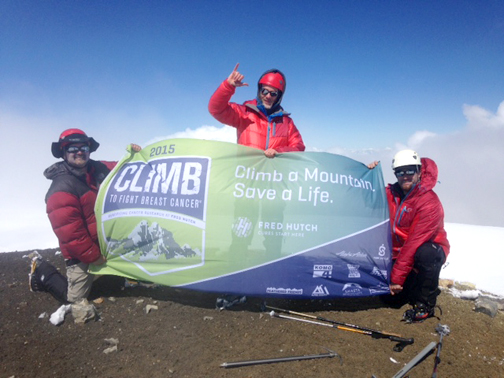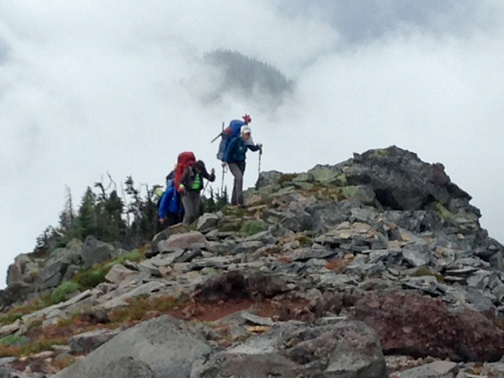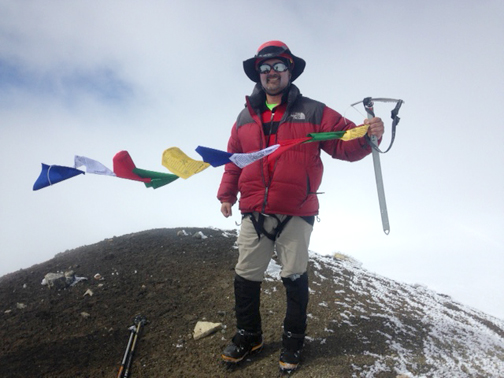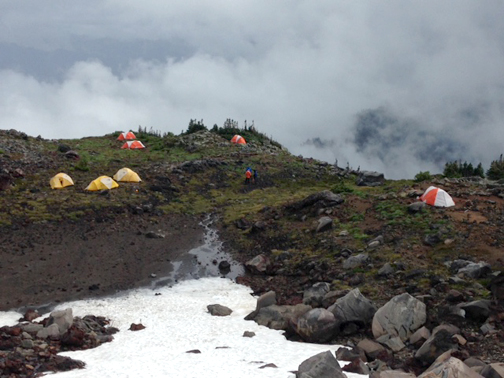
By Mary O’KEEFE
There are those who open their hearts to others … who never think twice about giving of themselves. They are the wonderful warmhearted people who make all the difference in our lives. ~ Gilda Radner
When people are told they have cancer there are many things that can go through their minds. Family, friends, treatment, life, death are just a few subjects that can race through thoughts as disbelief becomes reality. As victims of cancer begin the fight they are, if they are lucky, surrounded by those who offer support. Some do this by volunteering to drive to and from treatment, some by just sitting and listening and others will climb a mountain while carrying their friend or loved one in their heart.
Dr. John Rodarte, a pediatrician with a practice in La Cañada Flintridge, recently filled his backpack with Tibetan prayer flags on which were written the names of friends who have faced cancer. He then began the 10,781-foot climb up Mt. Baker in Washington State.
“It is a year-round glacier. There is always snow on the mountain,” Rodarte said.
This past winter was weak on the mountain, leaving less snow and more open crevasses, making the ascent a little more difficult.
Rodarte was climbing to raise funds for the Fred Hutchinson Cancer Research Center. The center was opened in 1975 by Seattle surgeon Dr. William Hutchinson to research heart surgery, cancer and endocrine disease. Hutchinson’s brother Fred was a baseball player with the Seattle Rainiers and Detroit Tigers in the 1940s and ’50s. He died of lung cancer in 1964 at the age of 45. The center was opened in his name and later Dr. E. Donnall Thomas joined the staff. Thomas is known for pioneering bone marrow transplantation. He was awarded a Nobel Prize in physiology or medicine.
Rodarte is a member of the Montrose Search and Rescue team; earlier this year other members of MSR also climbed Mt. Hood for the Fred Hutchinson Cancer Research Center.

“Since I had already summited Mt. Hood I wanted to try something new, and meet new people,” Rodarte said.
It was a three-day climb that started and ended with a rainstorm. The first day the team of four climbers and their guides climbed to base camp at 6,000 feet.
“It rained the first two days … so it wasn’t the best weather,” Rodarte said.
The second day the guides used as a training day.
“[Some of the climbers] were novice so [the guides] taught them how to use crampons,” he said, “but we had to limit our snow school because the weather was so terrible.”
The team spent a lot of time in their tents waiting for the weather to clear. The team started out with five climbers including two nurses from Portland, Oregon and a cancer researcher.
“There was another woman who was a breast cancer survivor who was 62 [years old]. This was her first climb,” he added.
She made it to base camp, which was more difficult than she had thought. She had to return and did not summit. The cancer researcher, who was excited about the climb, had swollen glands that turned into an infection. Rodarte was monitoring her while they were at base camp but eventually she had to be taken to a hospital.

On the third day the remaining team members began the climb.
“We left at 4:30 a.m. for a seven hour climb,” he said. “There was no rain or snow at the summit.”
Rodarte, along with the other climbers, placed the flags with the names of the cancer survivors and victims on the mountain.
“I carried prayer flags for a lot of people,” he said.
This is the fourth time Rodarte had climbed a mountain for the cancer center.
“Every year it gets more personal,” he said. “This year I had a friend who passed away from recurring breast cancer.”
Another friend is a 10-year survivor, and a co-worker has faced breast cancer. The climb is a way to raise money and awareness; however, to summit a mountain is not easy.
“When I was climbing … you are on a rope team and about 30 feet apart from one another. I had time to think,” he said. “There are moments when you are so exhausted and you start to complain but … then you think what you are climbing for and what those people have gone through and you realize this [pain and exhaustion] is nothing.”
In the four trips Rodarte has raised a little over $30,000 but more funds are needed for research and treatment. Donations are still being accepted. To donate, visit www.fhcrc.org/climb and type in John Rodarte in the Donate to a Climber space.




